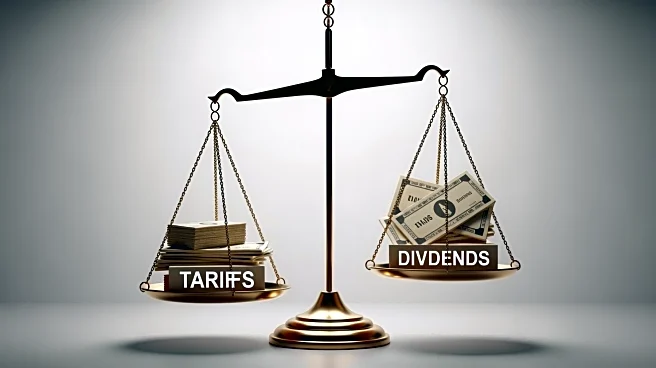What's Happening?
President Trump's proposal to distribute 'tariff dividends' of at least $2,000 per person from tariff revenue is facing criticism from the Committee for a Responsible Federal Budget (CRFB). The watchdog
estimates that the plan would cost the federal government around $600 billion annually, far exceeding the projected $300 billion in annual tariff revenue. The proposal, intended to reward taxpayers and reduce national debt, mirrors the structure of COVID-era Economic Impact Payments but poses significant fiscal challenges. The CRFB warns that if implemented, the policy could increase deficits by $6 trillion over ten years, exacerbating America's long-term fiscal issues.
Why It's Important?
The proposal highlights the complexities of using tariff revenue for direct payments to citizens and the potential impact on the U.S. economy. The significant cost of the plan raises concerns about fiscal responsibility and the sustainability of such measures. The debate underscores the challenges of balancing economic incentives with fiscal discipline, particularly in the context of rising national debt and budget deficits. The proposal's resemblance to pandemic-era payments also reflects ongoing discussions about economic support mechanisms and their implications for public policy.
What's Next?
The proposal's future depends on political and public support, as well as legal considerations regarding the use of tariff revenue. Stakeholders, including policymakers and economic analysts, will likely continue to evaluate the feasibility and impact of the plan. The ongoing debate may influence future discussions on economic policy and fiscal strategies, particularly in the context of addressing national debt and budget deficits.
Beyond the Headlines
The proposal raises ethical questions about the use of tariff revenue for direct payments and the broader implications for economic policy. The potential impact on fiscal stability and public trust in government spending practices highlights the need for transparent and sustainable economic strategies. The debate also reflects broader discussions about the role of government in providing economic support and the challenges of balancing short-term incentives with long-term fiscal health.









